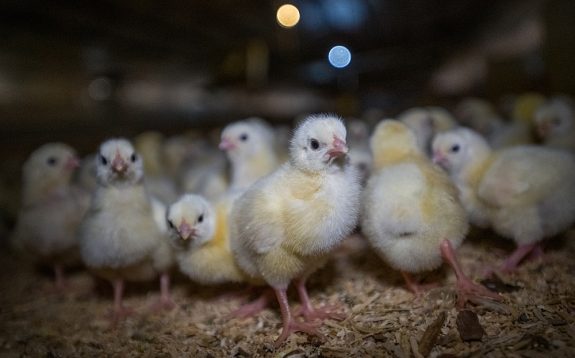Bird flu is spreading like wildfire among chickens and turkeys on factory farms across Canada and the US. There have now been reports of the highly pathogenic H5N1 strain of avian flu in southern Ontario, Newfoundland, North Dakota, Nova Scotia, and Minnesota.
Factory farms have created the ideal breeding grounds for deadly pathogens like avian flu. On Canadian turkey, duck, chicken and egg farms, tens of thousands of genetically similar birds are crammed into dark, windowless warehouses, in filthy conditions. This grim situation allows pathogens to spread quickly and potentially even mutate.
The Canadian Food Inspection Agency (CFIA) has already quarantined several Ontario farms experiencing outbreaks. But Animal Justice is concerned that authorities will order culls of tens of thousands of birds as the H5N1 bird flu virus continues to spread to more farms. At one smaller, backyard farm in Newfoundland, the CFIA already killed hundreds of birds earlier this year after bird flu was detected.
But birds on farms may not be the only victims. At least one wild bird in southern Ontario has now been found with the disease, which heightens the risk of it spreading beyond farms.
Wildlife rehabilitation centres across the country are now taking precautions and making adjustments to their processes to try to prevent the animals in their care from being exposed, adding additional expenses and limiting their work.
Zoos and other captive animal displays often keep birds confined in enclosures, often in terrible conditions, and put animals at risk of contracting the fast-spreading disease. The Toronto Zoo has already reportedly closed its aviaries.
Sanctuaries caring for chickens, turkeys, and other animals rescued from factory farms are also threatened by this outbreak. Should animals be exposed, the CFIA could potentially issue an order to kill off all the sanctuary’s avian residents—which would be devastating for the birds and their caretakers alike.
With the world beginning to emerge from a devastating global pandemic that likely originated in animals, the inhumane and unsanitary conditions on factory farms should be of concern to all Canadians. The current strain of H5N1 rarely affects humans, but transmission is possible with direct contact, and the virus can cause respiratory symptoms in people. Factory farmed cows and pigs can also incubate and spread influenzas and other viruses that put human health at risk. The World Health Organization, the World Organization for Animal Health, and the Food and Agriculture Organization of the United Nations are all concerned about the increasing trend of emerging infectious diseases due to the “industrialization of the animal production sector”.
Join the Animal Justice mailing list
Join the Animal Justice Mailing List
Banner image: Jo-Anne McArthur / Animal Equality / We Animal Media




